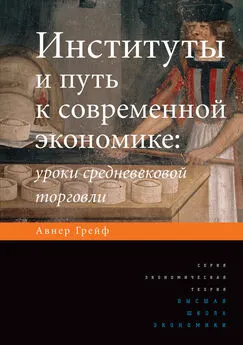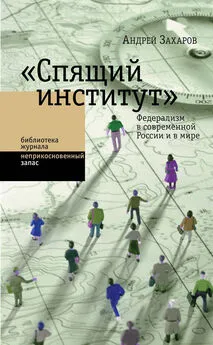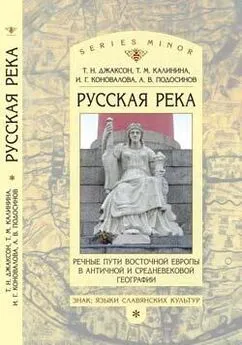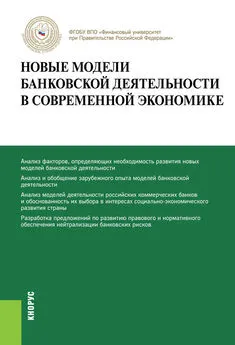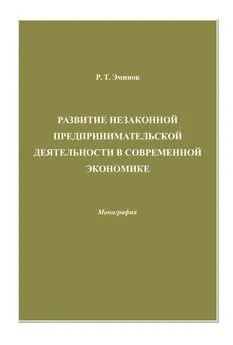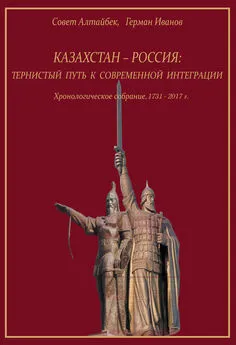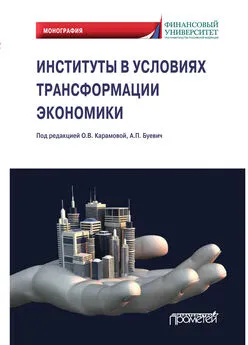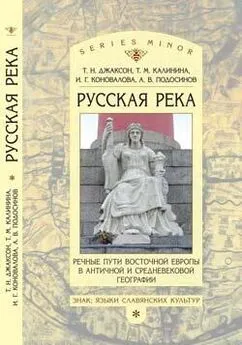Авнер Грейф - Институты и путь к современной экономике. Уроки средневековой торговли
- Название:Институты и путь к современной экономике. Уроки средневековой торговли
- Автор:
- Жанр:
- Издательство:Литагент «Высшая школа экономики»1397944e-cf23-11e0-9959-47117d41cf4b
- Год:2013
- Город:Москва
- ISBN:978-5-7598-0813-8
- Рейтинг:
- Избранное:Добавить в избранное
-
Отзывы:
-
Ваша оценка:
Авнер Грейф - Институты и путь к современной экономике. Уроки средневековой торговли краткое содержание
Принято считать, что существующие различия в экономике, политике и обществе отражают влияние различных институтов. Но среди экономистов, политологов и социологов нет единого мнения о том, что представляют собой институты, какие силы влияют на их сохранение и изменение и как мы можем повлиять на институциональное развитие. Эта междисциплинарная книга предлагает понятие институтов, которое объединяет внешне противоположные направления институционального анализа в социальных науках. В ней используется единый подход к изучению происхождения и сохранения институтов, их изменения и влияния предшествующих институтов на последующие.
Достоинства этого подхода демонстрируются при помощи сравнительных исследований институтов в средневековом европейском и мусульманском мире. Этот сравнительный анализ институциональных оснований рынков и государств и их динамики также способствует пониманию функционирования современных экономик. Он показывает своеобразие европейских институтов и объясняет, как и почему они привели к возникновению современной экономики, поддерживая обезличенный обмен, эффективные государства и использование знаний.
Институты и путь к современной экономике. Уроки средневековой торговли - читать онлайн бесплатно ознакомительный отрывок
Интервал:
Закладка:
Sugden R. Spontaneous Order // Journal of Economic Perspective. 1989. Vol. 3. No. 4. P. 85–97.
Sutton J. Sunk Costs and Market Structure: Price Competition, Advertising, and the Evolution of Concentration. Cambridge, MA: MIT Press, 1991.
Swidler A. Culture in Action // American Sociological Review. 1986. Vol. 51 (Apr.). P. 273–286.
Tabacco G. The Struggle for Power in Medieval Italy. Cambridge: Cambridge University Press, 1989.
Tadelis S. What’s in a Name? Reputation as a Tradeable Asset // Economic Review. 1999. Vol. 89. No. 3. P 548–563.
Tadelis S. The Market for Reputations as an Incentive Mechanism // Journal of Political Economy. 2002. Vol. 110. No. 4. P 854-82.
Telser L.G. A Theory of Self-Enforcing Agreements // Journal of Business. 1980. Vol. 53. P. 27–43.
Thelen K. Historical Institutionalism in Comparative Politics // Annual Review of Political Science. 1999. Vol. 2 (June). P 369–404.
Thomas H. Beitraege zur Geschichte der Champagne-Messen im 14. Jahrhundert // Vierteljahrschrift fuer Sozial-und Wietschaftsgeschichte. 1977. Bd. 64. Nr. 4. S. 433467.
Thrupp S.L. The Gilds / M.M. Postan, E.E. Rick, M. Miltey (eds). Cambridge Economic History of Europe. Vol. 3. P. 230–79. Cambridge: Cambridge University Press, 1965.
Tilly C. Coercion, Capital, and European States, AD 990-1992. Cambridge, MA: Blackwell, 1990.
Tirole J. A Theory of Collective Reputation (with Applications to the Persistence of Corruption and to Firm Quality) // Review of Economic Studies. 1996. Vol. 63. No. 1. P 1-22.
Tooby J., Cosmides L. The Psychological Foundations of Culture / J.H. Barkow, L. Cosmides, J. Tooby (eds). The Adapted Mind: Evolutionary Psychology and the Generation of Culture. N.Y.: Oxford University Press, 1992. P 19-136.
Topiks D. Supermodularity and Complementarity. Princeton, NJ: Princeton University Press, 1998.
Townsend R.M. Optimal Contracts and Competitive Markets with Costly State Verification // Journal of Economic Theory. 1979. Vol. 21. No. 2. P. 265–293.
Trackman L.E. The Law Merchant: The Evolution of Commercial Law. Littleton, CO: Fred B. Rothman, 1983.
TriandisH.C. Cross-Cultural Studies of Individualism and Collectivism /J. Berman (ed.). Nebraska Symposium on Motivation, 1989. Lincoln: University of Nebraska Press, 1990. P. 41–133.
Tversky A., Kahneman D. The Framing of Decisions and the Psychology of Choice // Science. 1981. Vol. 211. P. 453–458.
Udovitch A.L. At the Origins of Western Commenda: Islam, Israel, Byzantium // Speculum. 1962. Vol. 37. P. 198–207.
Udovitch A.L. Partnership and Profit in Medieval Islam. Princeton, NJ: Princeton University Press, 1970.
Ullmann-Margalit E. The Emergence of Norms. Oxford: Clarendon Press, 1977.
Van Damme E. Refinements of the Nash Equilibrium Concept. Berlin: SpringerVerlag, 1983.
Van Damme E. Stability and Perfection of Nash Equilibria. Berlin: Springer-Verlag, 1987.
Van der Vee H. Monetary, Credit, and Banking Systems / E.E. Rich, C.H. Wilson (eds). The Cambridge Economic History of Europe. Vol. 5. P. 290–391. Cambridge: Cambridge University Press, 1977.
Varian H.R. Monitoring Agents with Other Agents // Journal of Institutional and Theoretical Economics. 1990. Vol. 146. No. 1. P. 153–174.
Veblen T The Theory of the Leisure Class. N.Y.: Macmillan, 1899.
Vecchio A., Casanova E. Le Rappresaglie nei Comuni Medievali e Specialmente in Firenze. Bologna: R. Forni, 1894.
Verlinden C. Markets and Fairs / M.M. Postan, E.E. Rick, M. Miltey (eds). The Cambridge Economic History of Europe. Cambridge: Cambridge University Press, 1979. Vol. 3. P. 119–153.
Vitale V Il Comune del Podest'a a Genova. Milan: Ricciardi, 1951.
Vitale V Breviario della storia di Genova. 2 vols. Genoa: Societa Ligure di Storia Patria, 1955.
Volckart O. The Economics of Feuding in Late Medieval Germany // Working Paper, Institut fur Wirtschaftsgeschichte, Berlin, 2001.
Wach A. Der Arrestprozess in seiner Ggeschichtlichen Entwicklung. 1. Teil: De Italienische Arrestprozess. Leipzig: Haessel, 1868.
Waley D. The Italian City-Republics. 3rd ed. London: Longman, 1988.
Watson J. Starting Small and Renegotiation // Journal of Economic Theory. 1999. Vol. 85. No. 1. P. 52–90.
Watson J. Strategy: An Introduction to Game Theory. N.Y.: Norton, 2001.
WattM.W. Muhammad: Prophet and Statesman. Oxford: Oxford University Press, 1961.
Watt M.W. The Influence of Islam on Medieval Europe. Edinburgh: At the University Press, 1987.
Watts R.W., Zimmermann J.L. Agency Problems, Auditing and the Theory of the Firm: Some Evidence // Journal of Law and Economics. 1983. Vol. 26 (Oct.). P. 613–633.
Weber M. The Theory of Social and Economic Organization: Reprint. N.Y.: Free Press, 1964.
Weber M. The Methodology of the Social Sciences. Glencoe, IL: Free Press, 1949.
Weber M. The Protestant Ethic and the Spirit of Capitalism. N.Y.: Charles Scribner’s Sons, 1958 [1904–1905].
Weibull J. Evolutionary Game Theory. Cambridge, MA: MIT Press, 1995.
Weiner A. The Hansa / J.R. Tanner, C.W Previt'e-Orton, Z.N. Brooke (eds). The Cambridge Medieval History. Cambridge: Cambridge University Press, 1932. Vol. 7. P 216-69.
Weingast B.R. Constitutions as Governance Structures: The Political Foundations of Secured Markets // Journal of Institutional and Theoretical Economics. 1993. Vol. 149. No. 1. P 286–311.
Weingast B.R. Institutions and Political Commitment: A New Political Economy of the American Civil War Era: Memo. Stanford University, 1995.
Weingast B.R. Political Institutions: Rational Choice Perspectives / R. Goodin, H.-D. Klingemann (eds). A New Handbook of Political Science. N.Y.: Oxford University Press, 1996. P 167–190.
Weingast B.R. The Political Foundations of Democracy and the Rule of Law // American Political Science Review. 1997. Vol. 91. No. 2. P 245–263.
Weingast B., Marshall W. The Industrial Organization of Congress; or, Why Legislatures, Like Firms, Are Not Organized as Markets // Journal of Political Economy. 1988. Vol. 96. No. 1. P 132–163.
White L. The Medieval Technology and Social Change. London: Oxford University Press, 1964.
Wiessner P. Hunting, Healing, and Hxaro Exchange. A Long-Term Perspective on! Kung (Ju/’hoansi) Large-Game Hunting // Evolution and Human Behavior. 2002. Vol. 23. P. 407–436.
Williamson D.V. Transparency and Contract Selection: Evidence from the Financing of Trade in Venetian Crete, 1303–1351: Memo. U.S. Department of Justice, 2002.
Williamson O.E. Markets and Hierarchies: Analyses and Antitrust Implications. N.Y.: Free Press, 1975.
Williamson O.E. The Economic Institutions of Capitalism. N.Y.: Free Press, 1985.
Williamson O.E. Transaction Cost Economics and Organization Theory // Industrial and Corporate Change. 1993. Vol. 2. No. 2. P 107–156.
Williamson O.E. The Mechanisms of Governance. Oxford: Oxford University Press, 1996.
Williamson O.E. Transaction Cost Economics: How It Works; Where It Is Headed // De Economist. 1998. Vol. 146. No. 1. P 23–58.
Williamson O.E. The New Institutional Economics: Taking Stock, Looking Ahead // Journal of Economic Literature. 2000. Vol. 38 (Sept.). P 595–613.
Wilson E.O. Sociobiology. Cambridge, MA: Belknap Press, Harvard University Press, 1975.
Witt U. Evolution and Stability of Cooperation without Enforceable Contracts // Kyklos. 1986. Vol. 39. Fasc. 2. P 245–266.
Woolcock M. Social Capital and Economic Development: Toward a Theoretical Synthesis and Policy Framework // Theory and Society. 1998. Vol. 27. No. 2. P 151–208.
Wright M. Reputations and Sovereign Debt // Working Paper. Stanford University, 2002.
Wrong D.H. The Oversocialized Conception of Man in Modern Sociology // American Sociological Review. 1961. Vol. 26. No. 2. P 183-93. Reprinted as chapter 2 // Dennis H. Wrong, The Oversocialized Conception of Man (New Brunswick, NJ: Transaction Publishers, 1999).
Wrong D.H. The Oversocialized Conception of Man. New Brunswick, NJ: Transaction Publishers, 1999.
Yadira G. de Lara. Institutions for Contract Enforcement and Risk-Sharing: From Debt to Equity in Late Medieval Venice: Memo. Ente Einaudi, Bank of Italy, 2002.
Yadira G. de Lara. The State as an Enforcer in Early Venetian Trade: A Historical Institutional Analysis: Memo, University of Alicante, Spain, 2004.
Yang Li Mu. Essays on Public Finance and Economic Development in a Historical Institutional Perspective: Ph.D. diss. Stanford University, 2002.
Young H.P. The Evolution of Conventions // Econometrica. 1993. Vol. 61. No. 1. P. 57–84.
Young H.P. Individual Strategy and Social Structure. Princeton, NJ: Princeton University Press, 1998.
Young H.P., Burke M.A. Competition and Custom in Economic Contracts: A Case Study of Illinois Agriculture // American Economic Review. 2001. Vol. 91. No. 3. P. 559–573.
Zak PJ., Knack S. Trust and Growth // Economic Journal. 2001. Vol. 111. No. 470. P 295–321.
Zhang J. Nature of External Representations in Problem Solving // Cognitive Science. 1997. Vol. 21. No. 2. P 179–217.
Zucker L.G. Organizations as Institutions / S.B. Bacharach (ed.). Research in the Sociology of Organizations. Greenwich, CT: JAI, 1983. P 1-42.
Zucker L.G. The Role of Institutionalization in Cultural Persistence / W. Powell, P DiMaggio (eds). The New Institutionalism in Organizational Analysis, 83-107. Chicago: University of Chicago Press, 1991.
Примечания
1
Моя благодарность коллегам – Я.И. Кузьминову, обратившему мое внимание на параллели высказываемых Грейфом идей с ситуацией в современной России, а также А.А. Бальсевич, М.И. Одинцовой, Л.И. Полищуку, высказавшим свои комментарии и замечания к начальной версии текста.
2
Granato J., Inglehart R., Leblang D. The Effect of Cultural Values on Economic Development: Theory, Hypotheses, and Some Empirical Tests // American Journal of Political Science. 1996. Vol. 40. No. 3. P. 625.
3
Как отмечают У. Пауэлл и П. Димаджио [Powell, DiMaggio, 1991, p. 2], перспективные институциональные исследования, которые попытались выйти за рамки рассмотрения институтов как правил и функционального подхода (в качестве примера можно привести Веблена и Коммонса в экономике, Парсонса и Селзника в социологии), «утратили популярность, но не потому, что они ставили неправильные вопросы, а потому, что давали ответы, оказывавшиеся либо предельно дескриптивными (описательными) и относящимися лишь к определенной исторической эпохе, либо настолько абстрактными, что они лишались всякой объяснительной силы».
Читать дальшеИнтервал:
Закладка:
